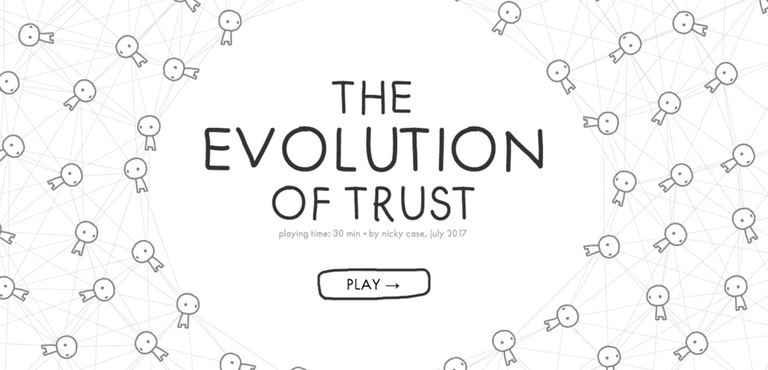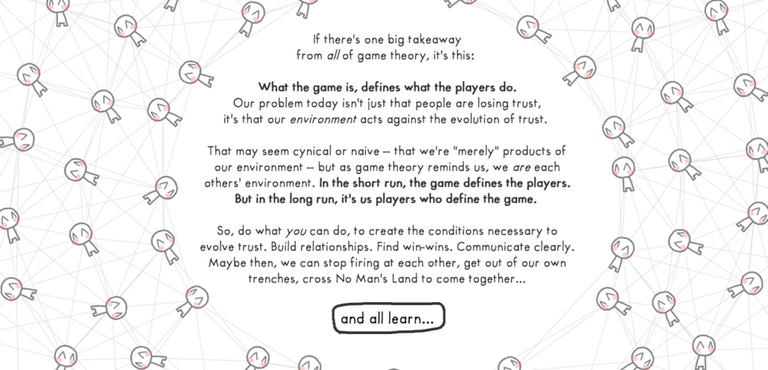On Monday I heard a speaker at a blockchain event talk about the evolution of trust, and since then this topic has been on my mind a lot (also because of "the ONO situation" --> see bottom of this post).
The blockchain is not trustless
We always describe the blockchain as a trustless system, but of course it's not really trustless. We have just shifted from whom we trust to what we trust: an algorithm.
- Thousands of years ago, all we trusted in was God/a higher power.
- Over time, when we started transacting, we shifted our trust to people.
- Then, a few hundred years ago - maybe with the arrival of the industrial age - we shifted our trust from individual people to central institutions.
- And now, in the digital age, we trust an algorithm more than a central authority.
Fascinating.
So, I googled "the evolution of trust" today and came across this site, that I believe everyone who wants to understand blockchain and game theory in more detail should have a look at.
Learn Game Theory in a game. 30 minutes well spent! You will feel smarter afterwards.
In any game (or organisation) there are cheaters and honest people, and sometimes honest people make unintentional mistakes. So how can you really trust whom and what with absolute certainty?
In order to keep facilitating more and more trust, you can exchange the players or you can change the rules of the game. Or both.
There are zero-sum-games (which means when one party wins, another must lose), and there are non-zero-sum games (which is when all parties try to create win-win solutions).
Without the non-zero-sum game, trust cannot evolve
(According to the game/website above.)
For me this is really key.
We are living in an age where our values are evolving from "profit for me" to "wellbeing for all".
When values change, it has a ripple effect, because they are at the core of everything we do as individuals and as a society. (Of course values don't change over night, but over generations.)
Values are WHY we do whatever we do and therefore they influence our motivation, intention, attitude - and of course also who and what we trust. Consciously or unconsciously we will always try to align ourselves and our environment with our core values.
The arrival of the blockchain and decentralization is a symptom of that collective value shift.
While a centralized technology will keep on separating the many from the few; the concept of decentralization - flat peer-to-peer networks without hierarchies or exclusivity - aim to connect and include people even from the remotest corners of the world and provide equal and fair chances for all.
Algorithms can change, players can change
Earlier this week I suddenly found myself in a small but very active and passionate private telegram group of Steemians, discussing values. In particular the ones of the new platform ONO vs. Steemit.
As I mentioned in my last article, I had no idea how many Steemians had become unhappy with our platform here (aka: losing trust in it).
On Steemit, apparently the algorithm still allows for people with a "profit for me" mindset to be successful and play a (nearly) zero-sum game. At least that's what I gather from all the comments about some people "draining the reward pool".
That algorithm represents our environment here. That environment could be changed, so that it creates more trust in the platform again and is more aligned with the values of those Steemians.
Of course there maybe plenty of other Steemians who are perfectly happy with the way things are because their values are aligned with how the Steemit platform operates. From their point of view there might be no need to change anything.
If the algorithm won't change, then the players will change.
And maybe that's a healthy, self-cleaning process?
The unhappy players will look for an environment that is more aligned with their values - a different algorithm they trust more. Currently, ONO seems to promise that. Whether ONO will follow through on that - we will see.
And the players who are happy in the current environment will of course stay.
This, in itself is decentralization, isn't it? The times of There can only be one are over.
Two similar platforms can peacefully co-exist, for different audiences and communities with different tastes, values and trust-requirements.


One thing that is not always true seems ' change the game or change the players' but all players have different agendas. In every game in the end some players will not be satisfied.
And steemit is still evolving! We try to make best out of it every day to see what can be done better
hahaha. yes girl.
so damn right! thanks for it
resteemed!
Thank you!!!! :)